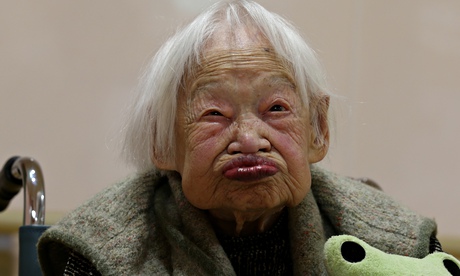
Plenty of sleep and a varied diet are the secrets to a long and healthy life, according to Misao Okawa, the world's oldest person, who celebrated her 116th birthday on Wednesday.
Okawa, who became the world's oldest person last June following the death at 116 of fellow Japanese Jiroemon Kimura, was given a cake with just three candles at her nursing home in Osaka – one for each figure in her age.
Okawa is one of only five people alive – all women – confirmed as having been born in the 19th century.
While she has spoken of her love mackerel sushi, which she eats at least once a month, Okawa isn't particularly fastidious when it comes to food.
"She eats sushi, her favourite, and whatever she likes – beef stew, spaghetti, or sashimi – every day," said an employee of the nursing home where Okawa has lived for the past 18 years.
"She always says the secret to living a long time is to eat a good meal and relax," the employee added. For Okawa, that means an uninterrupted eight hours' sleep every night.
In 1898, the year Okawa was born, the Spanish-American war was in its infancy and Queen Victoria was still on the British throne. Okawa married in 1919 but her husband died in 1931, more than eight decades ago. Their marriage produced three children, two of whom are still alive and in their 90s. Okawa has four grandchildren and six great-grandchildren.
Okawa has dealt with the media attention with incredulity.
When notified that she was in line to become the world's oldest woman last year, she reportedly said: "Have I really lived that long?"
The centenarian, one of about 24 Japanese alive who have passed the 110-year milestone, claims she has never been ill, and quickly recovered after breaking her leg in a fall at the age of 102. "She is in good shape, and is even still gaining weight," the nursing home employee said.
Experts attribute Japan's enviable longevity statistics to its traditional low-fat diet, affordable health care and decent pensions.
Other studies point to the advantages of staying active and spending time with family and friends.
Japan was home to more than 54,000 centenarians last year and its elderly population will soar in the coming decades. About a quarter of its 127 million people are already aged 65 or over, but that is expected to swell to about 40% by the middle of the century.

